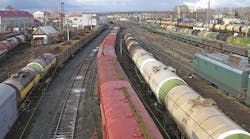CP Seeks Justice Department Probe while Railroads Slash Costs
Lawyers for Canadian Pacific have asked the U.S. Department of Justice to investigate several Class 1 freight railroads for alleged antitrust violations during CP’s unsuccessful bid to acquire Norfolk Southern.
This action follows a contentious campaign by CP in which it attempted to acquire and merge with NS, an effort that drew criticism from shippers and U.S. lawmakers. The NS board of directors rejected three bids made by CP that totaled about $28 billion in cash, which the NS board called inadequate, also rejecting CP’s argument that mismanagement by NS top executives kept the railroad’s costs high and stock valuation low.
Most recently in response to congressional inquiries the Surface Transportation Board created serious doubt about whether CP could gain the board’s okay for creation of a voting trust while the STB mulled merger approval.
In his Jan. 19 letter to the DOJ Antitrust Division, CP attorney Matthew J. Reilly asserted that conversations between executives of Union Pacific, BNSF and CSX railroads may have violated antitrust law. The CP letter to DOJ did not mention NS management having been involved in any of these conversations.
Reilly told DOJ that “the unprecedented action of major competitors organizing to block a new entrant from enhancing competition to the U.S. merited the attention of the antitrust authorities.” He cited press statements from the rail companies indicating they were working with each other to block the CP-NS merger “through a widespread campaign of meetings and solicitations with customers, the media and other interested parties.”
“We are deeply concerned that these actions are being taken for the primary purpose of restraining trade,” Reilly told Justice. “The fact that these major railroads have joined to work so feverishly against CP’s proposal speaks volumes about their concerns regarding the impact the transaction would have on their competitive position.”
It is questionable whether the Justice Department will intervene. Although STB regulation of railroads operating in the U.S. is confined to mergers, rates and services, DOJ traditionally stays out of this area. In addition, parties who believe competitors have injured them by violating antitrust laws tend to file civil suits, where a win results in treble damages.
Such litigation would pile up considerable legal costs for CP if it chose to take that route. It’s difficult not to draw the conclusion that the letter to DOJ looks more like the railroad’s top management is tossing a live hand grenade behind it while exiting a messy, protracted but unsuccessful merger attempt.
In addition, some financial analysts have interpreted recent talk by CP CEO Hunter Harrison regarding a potential stock buyback plan as a sign that it is abandoning its bid for NS.
Cutting Capital and Payroll Costs
One of the key arguments made by CP for the merger was that NS management had not pursued aggressive cost cutting to boost shareholder value. CP pointed to the extensive cost reductions it instituted after a group of shareholders led by New York hedge fund manager Bill Ackman gained enough control to install new management at the Canadian railroad.
However, it now appears that almost everyone in the rail industry is casting about for ways to reduce costs in the face of depressed bulk commodities traffic, particularly in oil exports, and intermodal traffic decline that followed a banner year for that segment in 2015.
Joining the trend, CP announced that it was eliminating another 1,000 jobs on top of the thousands it cut earlier. It also had cut routes and pulled rolling stock from service it intends to sell.
NS unveiled plans to cut 2,000 jobs by 2020, including 1,200 this year, and begin eliminating locomotives and cars from its fleet to reduce maintenance expenses. NS also said it will cut overtime by half from 2015 levels and will eliminate or downgrade 1,500 miles of secondary lines by 2020, including 1,000 miles this year.
The company earlier announced the merging of two divisions that served the West Virginia and Ohio coal country. It expects these and other changes can help it achieve annual productivity savings of more than $650 million per year by 2020, growing from an initial $130 million in 2016.
CSX, which like NS is heavily involved in moving coal, also announced that it is consolidating offices in its West Virginia operations. “Looking forward, we expect volume to decline in the first quarter,” says CSX CFO Frank Lonegro. “We expect a challenging freight environment to continue as the headwinds associated with coal, low commodity prices and a strong U.S. dollar more than offset the markets that will show growth.”
Also hurt by weakness in the export market for coal and oil stemming from China’s wobbly economy and the continued strength of the U.S. dollar is Union Pacific, which has attempted to reduce costs by furloughing workers and putting locomotives into storage.
Although BNSF and Kansas City Southern are doing better in terms of their financial results, both plan to substantially reduce capital spending in 2016 compared to their outlays last year, and they are taking other cost control measures.




